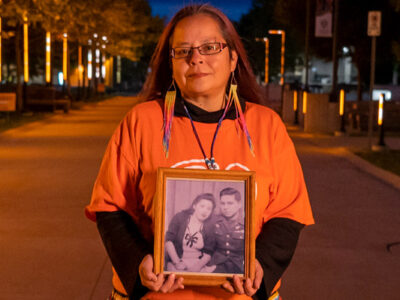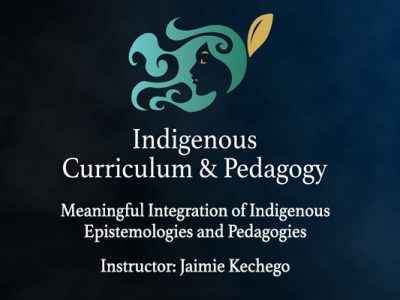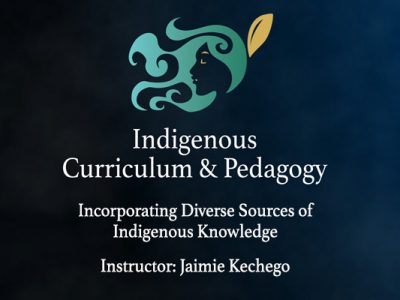Ahnii! Hi, my name is Jaimie Kechego and I am the Indigenous Coordinator of Indigenous Curriculum and Pedagogy at the University of Windsor. I started my journey in this role in September 2019, and what a journey it has been thus far. To go from being a student here to, among other things, teaching campus members about Indigenous culture, history and many other facets of indigeneity, feels like I have come full circle.
Watch the Foundation Series Sessions
Pulling Together I – Foundations Series – Introduces you to the Indigenous Peoples in Canada, their histories, and their cultures. It also answers some questions that people often ask about Indigenous Peoples, and debunks some of the common myths and misconceptions. Download the PowerPoint.
Pulling Together II – Foundations Series – Examines the role of colonization and how it continues to affect Indigenous Peoples in Canada and define the relationship between Indigenous and non-Indigenous people today. Download the PowerPoint.
Pulling Together III – Foundations Series – In Canada, we are still dealing with the legacy of colonization. Media, institutions, and ordinary people still perpetuate harmful stereotypes and beliefs about Indigenous Peoples. This creates a society that continues to discriminate against Indigenous Peoples. Decolonization is the “undoing” of colonization and a process by which Indigenous Peoples are regaining their rightful place in Canada and are thriving. In session 3, we address some of the challenges that exist because of centuries of institutionalized racism. Download the PowerPoint.
When I think about explaining my role and my job, I think about what that conversation would look like if I were to have it with my Grandmother, Mildred Riley (Milly). My Gramma has been gone for over 10 years; she passed away in 2007. She saw me graduate with my first undergrad degree in 2006. I know she was proud of me that day and encouraged me to pursue my Masters, even offering financial incentives (she gifted me with $1,000 after my first graduation). Had she been alive to see me teach, I believe she would have been surprised at what I am teaching, how I am teaching, and where I am teaching.
My Grandmother attended the Mount Elgin Industrial Day School. This was a residential school located two hours away from Windsor. Attendees were not allowed to speak their language, practice culture, practice ceremony, and were subject to physical/sexual abuse. Milly grew up learning various skills to survive (not thrive) in a Western world. Due to the oppressive effects of the Indian Act, by the time Mt. Elgin opened, most families were resigned to send their children to Mt. Elgin industrial school. During this time (the Great Depression), there was also a lack of employment and money. My Grandmother had to learn how to be resourceful at a very young age. She carried this resourcefulness with her all through her life and passed some of that on to me (i.e. collecting plastic bags, margarine tubs, and other upcycled items).
This is how I envision my conversation with her. Picture this: We are at her house, windows are open, fresh linen on the line, I pull into the laneway and park my car under the shade of the biggest pine tree, grab the bag of potatoes I brought with me, and head in. My Gramma is in the kitchen preparing a meal to cook for later. She looks tired, but swears she is feeling fine. It’s the weather, it always makes people look tired when it is very hot out. I ask her if there is anything, I can do for her while I am here. She tells me no and to get a drink and cool down. I watch her as she shuffles around her kitchen, cutting various vegetables and meat. It is just me and her here. My Dad is at work, and my aunties are in town.
It’s so hot. The kind of hot that gets stuck in your throat and makes you thirsty. I adjust Gramma’s ceiling fan and floor fan for more wind and simply let the wind do its job. When I am cooled down, she asks me if I am hungry (she always asks me this when I come over). I tell her that I am still full from a big breakfast I had earlier. She sits on her favorite blue recliner and begins to ask me about what exactly it is I do at the University.
Gramma Milly – Tell me Grand-daughter, what you do at the University?
Me – Well Grandma, I teach about us.
Gramma Milly – What do you mean, “you teach about us”?
Me – I teach them knowledge they should have received while in elementary and high school. I teach them protocols and processes that they did not read about in their textbooks.
Gramma Milly – Why? What is that going to do?
Me – I hope it will do a few things Grams. Like, have Indigenous history fully included in future school curriculums. Or, provide space for our knowledge and teaching methods. Having these things is just the beginning. Imagine if Perry was still alive and I had him come in and share his knowledge of deer hunting and how he learned do it (when I started this position, I thought of my brother, who also passed away awhile back, and how he would have made an excellent guest speaker). Having people like Perry come and share their knowledge would provide a different perspective on teaching and learning; it is not four walls and a building where learning happens.
Gramma Milly – Why would they want to learn about deer hunting? Or our language? Or who we are? All these things, they didn’t care about them when I was a little girl.
This is where my conversation staggers because it’s true. Western education saw Indigenous peoples as exotic others, mystical and unreal. The Canadian education system didn’t care much to teach children about the “natives” or what really happened in early Canadian history. Just like not very many people cared about the type of education that thousands of Indigenous children received, or what was happening in those schools.
Me – (After a pause) Through the Truth and Reconciliation Commission’s Calls to action, it was agreed that education needs to be redesigned that will include and support Indigenous knowledge in school systems from elementary to post secondary.
Gramma Milly – Well Rome wasn’t built in a day; I hope there is deep and thoughtful consideration as to whose knowledge (we are not all the same, do they know this?) is included and where that knowledge comes from. What is it like, teaching about us? Using our language and sharing some of our practices?
Me – I do not know if I will upset anyone or offend anyone, I do not know if I am giving enough or too much. It is scary Gramma to teach about us. I feel fear, but it is the good kind of fear, not the one where I run and hide. The pressure of being on point is astronomical, but after my voice stops shaking, and my breathing returns to normal, I feel grounded. After I take a big breath and look at the people who want to learn, I feel relieved. It still feels unreal at times, but I am very proud of where I am at and how I can help all my relations, both Indigenous and Non-Indigenous. There is one ally, I think you would get a kick out of her…I wish you could have a conversation with her, she reminds me of you in some ways.
Gramma Milly – You cannot worry about offending anyone. You will not be able to continue what you’re doing. People will always find an excuse to be miserable or unhappy. That has nothing to do with you. You were never a runner; you were an investigator. As a child, you were very inquisitive, always asking why and how come. You were also very argumentative, I really thought you were going to be a lawyer one day because of how much you like to argue. Your friend, the one you want me to meet, keep her close, it is those friends that will have your back should you need it. You show me a perfect person, and I’ll show you the million dollars I keep hidden (which obviously meant there was not an iota of hidden money anywhere, just like there are no perfect people in the world).
Gramma sighs softly with those last thoughts. Then she yawns. I recognize that she is tired and its probably time for her afternoon nap. I stand up and give her a hug and tell her, I will be back in a couple days to check on her.
Gramma Milly – Good, when you come back you can tell me more about what you teach while you clean my ceiling fans and cut my grass (her yard was huge, with a push mower, took me 3 hours some days to cut her grass). Bring gas for the lawn mower when you come.
Me – Sounds good Grams. See you next time. Love you.
I miss her wisdom and wit daily, and with my traumatic brain injury sometimes my memories are fuzzy, but when it comes to education, Gramma was always an advocate, and I remember that about her. Gramma Milly didn’t get the chance to go to college or university, but she saw it as a great tool to help our family out of poverty and provide a better way of life. I think she would have been proud of me and how I am trying to bring Indigenous knowledge and teaching methods to the University of Windsor. I am grateful to Gramma for her strength and resilience, among many of the things she taught me. Without her in my life, I don’t know that I would have made it this far.
Miigwetch Gramma.
Jaimie Kechego is the Indigenous Curriculum and Pedagogy Project Coordinator for the Centre for Teaching and Learning. She is Anishnaabwekwe from Deshkaan Ziibing (the Chippewa of the Thames First Nation reserve) located near London, Ontario. Jaimie’s academic experience began at the University of Windsor as she pursued her Bachelor of Arts degree. Her professional experience with the University of Windsor began at Turtle Island as the Student Representative for the Aboriginal Education Committee. After graduating from the University of Windsor, she secured a position with the Greater Essex County District School Board as the First Nation, Metis and Inuit secondary school counsellor for eight years. Jaimie went back to the University of Windsor to pursue her Bachelor of Education in 2014 and graduated in 2015. Recently, Jaimie completed her requirements for a Master’s degree in the Field of Educational Leadership focused in Aboriginal Education at Western University.










Awesome my friend, I always knew you were going to do great things. Keep reaching for those stars and know I am rooting for you. Love and light to you.
Great thoughts Jaimie, thanks for sharing insights on your Gramma as well as on how you’re feeling about this important role you’re playing in the university. Always a treat to attend your sessions and continue learning from you, take good care, Chi-Miigwich.
Chii Miigwetch Vicky 🙂
Love you my dear Friend.